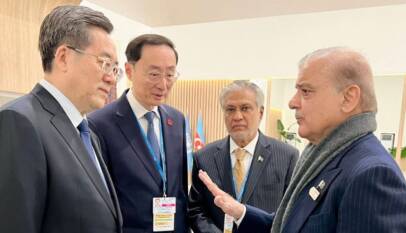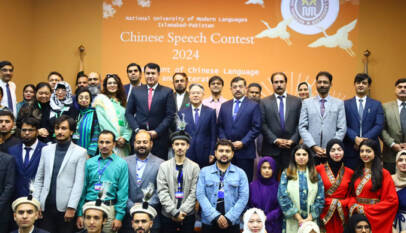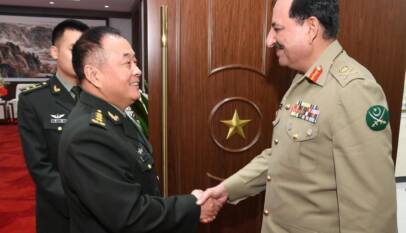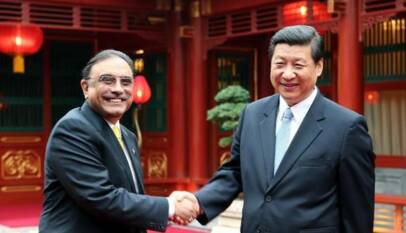Expert says CPEC will help Pakistan in maintaining economic stability
Shakeel Ahmed Ramey, a political economist writes that to take advantage of the CPEC, the new government will need to adopt a smart policy. The framework for industrialization has been signed, but Pakistan will have to work extra hard to make it succeed. He also says to attract foreign investment, a competitive and rewarding policy is required. However, in order to take advantage of the opportunity, it will need to pursue a reasonable and prudent policy. In addition, the government will need to give the economy a boost through rapid growth in order to boost job creation and combat poverty and inflation. In his article, Mr. Ramay adds Pakistan should request that China redirect funds from the Six-100 initiative and the Global Development Initiatives to the CPEC partnership. These efforts are mostly concerned with food security and agriculture. He concludes Pakistan should ask China to share its experience with reducing poverty through skill development, job creation, and the use of e-commerce.
Political turmoil diverted attention from economic turmoil. Economic indicators disappeared from the screens and political number started to occupy the mainstream media. However, it could not change the reality and facts. The fact is that economy is not performing well. Despite, all the claims and rosy picture strategy of outgoing government, economic indicators are telling a sad story. Current account deficit, which came down due to increase in remittances through Roshan digital account and expense loans in the form of Naya Pakistan Certificates, is increasing again. It was pointed out by sane voices that it is not sustainable, but government advisors and experts did not give any head to it.
Owning to bad policy choices foreign reserves are in declining mode and thanks to China that it did not enter into the single digit. Export growth is not showing sustainability, as the boom of export coming to reality. Government could not capitalise on the window, which COVID-19 created for Pakistan. It is well-known fact that COVID-19 impacted traditional supplier of textile products including Bangladesh, India etc. to USA and Europe. It gave space to Pakistan to exploit the supply gap. Allah was merciful and He protected Pakistan from the worst impacts of COVID-19 but government could not turn it into an opportunity for long term.
Government missed or did not use according to the potential of many opportunities to put economy on fast track and China-Pakistan Economic Corridor (CPEC) of them. CPEC offers sustainable solutions to Pakistan but could not get the desired attention from the government. Although, in beginning PTI showed great enthusiasm for CPEC like creation of CPEC Authority but could not convert it into a success story. CPEC Authority was created with great pump and show but could not deliver because government kept on experimenting and turned it into political battle ground. Board of Investment only kept on changing chairman and telling fancy stories. The real task of industrial cooperation is still not operational.
As a result of mismanagement, now Pakistan is facing daunting challenges in the form of depleting foreign reserves, higher inflation, lower economic growth and higher uncertainty. Pakistan is also in need of $35 billion for the next fiscal year to pay the debt and liabilities.
Thus, new government will to present solutions for all these problems. In addition, government will have to inject new momentum to economy through rapid growth to create higher job creation and combat the challenges of poverty and inflation.
Fortunately, new government has the opportunity to overcome above challenges in the form of China-Pakistan Economic Corridor (CPEC). However, to exploit the opportunity (CPEC) it will have to adopt a wise and smart policy. For that purpose, government must have to devise and follow a two-prong policy, which must give boost to growth and inclusive development, simultaneously.
First, for growth, government should prioritise industrializing process and cooperate agriculture. Although, the framework for industrialization has been signed but Pakistan will have to put special efforts to make it successful.
First of all, government will have to complete the Special Economic Zones (SEZs) on war footings and support these SEZs through comprehensive policy and regulations. There is need of a competitive and lucrative policy to attract foreign investment. Besides, there is also need of a comparative analysis of Pakistani SEZs with other countries’ SEZs. Government will also have to properly market our SEZs, as geographical location of Pakistan enhances competitiveness of our SEZs (for details please read report A Road Map to Implement Second Phase of CPEC).
For cooperate agriculture government will have to act on two levels. First, Pakistan needs a new cooperate agriculture policy, the old ordinance has been expired. Second, the cultivable barren lands of Pakistan must be utilized for attracting the Chinese companies to invest in Pakistan. Pakistan should work to devise a formula to protect the rights of state and attract investment, simultaneously. It is urgently required, as private land holdings are not attractive for cooperate sector due to its small size (almost 90 private farms are less than 12.5 acers).
Second, for development government will have to use agriculture, skill development, employment and e-commerce. First, government will have to devise instruments, which can attract funding and opportunities for small farmers. Although, CPEC already provides opportunities but Pakistan can explore new opportunities like Six-100 programme and Global Development Initiatives. As, food security and agricultures are the prime focus of these initiatives. For that purpose, Pakistan can also ask China to divert resources from the Six-100 programme and Global Development Initiatives for the cooperation under CPEC. Fortunately, China is also willing to enhance cooperation under these initiatives. Thus, Pakistan must put forward doable proposals for cooperation.
Second, Pakistan should request China to share its experience of poverty elevation through skill development, employment generation and use of e-commerce. It is well established fact that these areas played a key role in eliminating poverty in China. Moreover, the role of industry in poverty alleviation must also be explored for poverty alleviation in China. It will provide blueprint to engage industry for development purpose in Pakistan.
In the conclusion, ruling elite, new government and parties will have to work on four areas, which is pre-requisite to make the CPEC cooperation a success. First, the ruling elite will have to put the house in order and political elite will have to come of out mentality of self-greatness. Second, government will have to devise SEZs policy and cooperate agriculture policy immediately. Third, there should be no political games or point scoring to present itself champion of China-Pakistan brotherhood. As, China does not care about parties or individuals, China only cares about State of Pakistan and People of Pakistan. Especially PMLN and PPPP will have to learn this and they must avoid self-projection on this front.
Fourth, Pakistan must deploy people to steer cooperation, who understand China, Chinese model of development, governance and international relations. Western trained minds will not be able to comprehend the dynamics of China and move the cooperation smoothly. They will always try to compare China with West, which has no rational. As, we cannot compare apples with organs.
Lastly, government will have to understand that actions are required urgently. There is no time to waste or more specifically, there is no space for lengthy speeches. People are not looking for speeches, they are looking for solutions. Thus, the focus must be on work.
Chinese Ambassador highlights significance of Third Plenary Session for China-Pakistan cooperation
The Third Plenary Session of the 20th Central Committee of the Communist Party of China ha…












